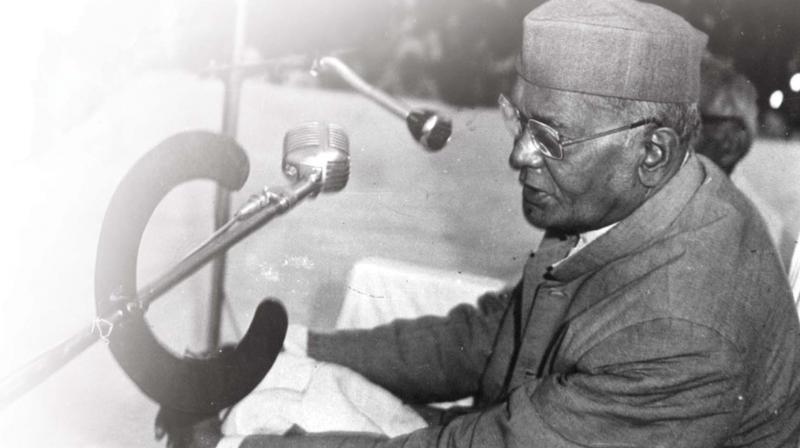Emergency betrayed exceptional Malayali'
Kerala gave ruling United Front 111 seats out of 140 as if endorsing Emergency in 1977 elections

Malayalis can rightfully take pride in the achievements of their society. But when this pride turns into a prejudice, by perceiving ourselves as exceptional, we get caught in a glass cage in a time warp, impeding our transformation into a thinking political society. List of reasons of our pride is rather long - Land reforms, decentralisation, claim of having a secular outlook, literacy, high human development indicators are some.. But the fall which succeeds pride starts at the point of perception of Malayali Exceptionalism. Many of us ignore the fact there was a very radical land reform movement in Jammu and Kashmir under the leadership of National Conference of Sheikh Abdullah and the initiatives of decentralization undertaken in Karnataka by Ramakrishna Hegde and Abdul Naseer Saheb. We do have achievements, but it is high time that we recognized others’ also and be open for comparison and critical evaluation.
It is a fact that we have fallen behind in the decades since 1990s, when our economy started growing very fast and in consumption inequality (which does mirror income inequality), we began ranking first among Indian States. Extreme communalism is also rearing its head with reports of people joining internationally dreaded terrorist movements. These hardly constitute a ground for any exceptonalism or pride. We need to come out of the glass cage of exceptionalism and look at others who have also been testing laboratories for new initiatives, instead of throwing stones from inside the glass cage of perceived superiority and exceptionalism.
The past electoral behavior of the Malayali voter is interesting, when we claim as an aware and enlightened citizenry. More often than not, we were unmoved by events in other parts of India and abroad, despite being an ‘Exceptional’ literate lot who read newspaper every dawn and nowadays sit before prime time din of the electronic media every evening. The Soviet intervention in Hungary 1956 shook the roots of the Communist movement in the west. But Kerala elected the Communists in 1957. Similarly, the Prague Spring of 1968 and the fall of the Soviet Union led to crumbling of powerful Communist parties across the world. But in Kerala, the Left which still officially professes Marxism Leninism and dictatorship of the proletariat retains the mass base and has come to power in three elections after 1991; perhaps they have had leaders who sense the pulse of the people.
The Malayali voter has not supported any rebellion against the national ruling establishment, be it post emergency-1977 or 1989 election, when the then ruling Congress party was thrown out of power on the plank of civil liberties and corruption respectively by the opposition groups, which formed short-lived governments. The Malayali voter’s massive support to the emergency regime has been a puzzle and is sought to be explained away by the hypothesis that she or he had not experienced the excesses and hence welcomed it as pause against strikes and agitations. It is also stated that the Malayali welcomed discipline and orderliness. This is far from being true. The spate of agitations by students and railway men etc. during 1973-75 was a countrywide phenomenon. During 1968 to early 1970s, there was worldwide student, youth and labour unrest, as capitalism had entered its stagflation phase after the post second world war golden age.
As a self and others’ acclaimed aware society, Malayalis should have valued civil liberties intrinsically. Democracy and fundamental rights cannot be sacrificed at the altar of so called ‘orderliness’, which also means right to take away the life of a citizen at the whim of a state functionary. The Malayali voter’s support to the Emergency can be better attributed to the successful coalition of social and communal interest groups which decide block voting patterns and subordinate pure political agenda. Arrayed on one side of the electoral battle, these forces formed a formidable coalition. Resultant electoral arithmetic based on block voting, favoured the Emergency regime. All other explanatory variables had only secondary or tertiary impact. It is a fact that other southern States, which voted in a similar way, had also social blocks favouring the ruling party and in the north, new blocks emerging from social churning had favoured the victorious opposition.
It is needs pondering as to what level we are politicised, that is, to think spontaneously and freely on issues affecting polity, without looking at the affiliations of those in power. In other words, how successfully can we give vent to a popular feeling of dissatisfaction against any questionable act by those who wield power? Here, we have miserably failed. Only interested and programmed protests take place. None other than Jayaprakash Narayan, who visited Kerala, just before the Emergency, said this succinctly that his idea of self-transformation or total revolution hardly had any taker in Kerala where the temperature of party politics is high, which he felt, was due to elections round the corner. It was not so.
Unsponsored protests hardly resonate in Kerala. We are highly politically compartmentalised party identity-wise, but are increasingly getting depoliticised and this has left the large space between the state with its bureaucratic machinery and society, a parched one. There is hardly a public intellectual to raise a saner voice against injustice of any gradient. Prof K N Raj had fought for equal rights to park his car in a place where only government vehicles could be parked and won the case. Prof M P Manmadhan had opposed Emergency and gone to jail. Now we lack these kinds and this is our peril. Academia has since then become more a corruptive force than a corrective one. But there are also encouraging signs of rank and file of political parties leading the leaders through social media in recent times. The Malayali has many achievements to his pride, but perceived exceptionalism is a time warped glass cage. The sooner it is broken the better.
(The author is a commentator on issues of Indian federal polity)

